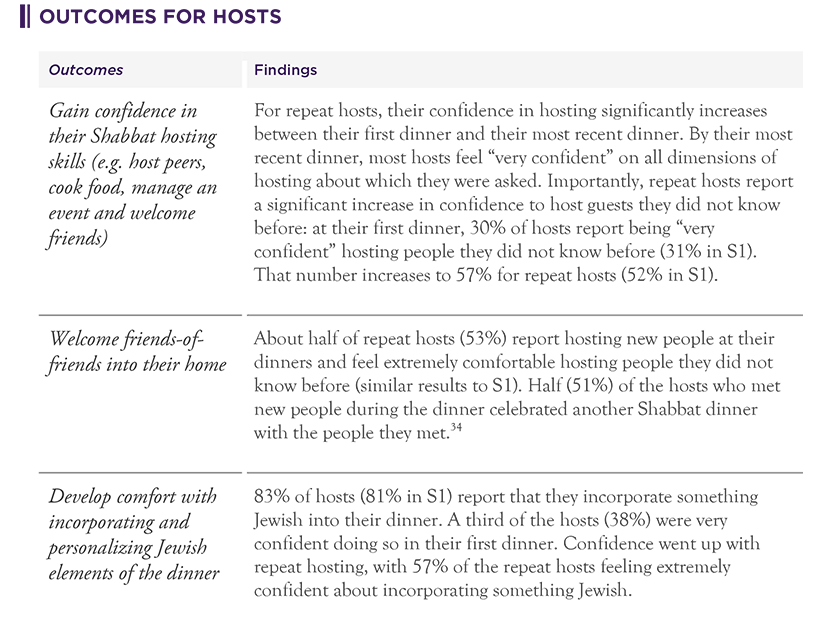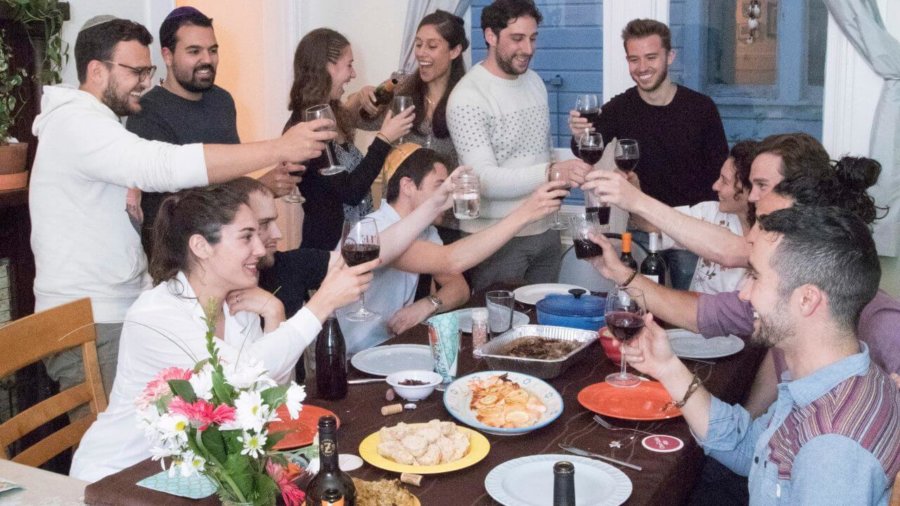Challenge
OneTable empowers Jewish young adults in their 20s and 30s to build community by finding and creating their own Shabbat dinners and rituals, with the ultimate goal of forming a lifelong Shabbat dinner practice. Since its inception in 2014, OneTable wanted to identify and assess progress toward its goals and to measure specific outcomes for its users (both guests and hosts). To this end, from 2014-2017 OneTable engaged Rosov Consulting. They wanted to know: Who was hosting and “guesting at” Shabbat dinners? What were the outcomes of these dinners, and how was it influencing their users’ engagement in Jewish life? These are just some of the questions Rosov Consulting had to answer. As Al Rosenberg, Director of Communications of OneTable says:
In 2017, we wanted to know how and to what extent our tools were working. We are a data-driven organization, but we needed to know what the numbers meant for our users. We wanted to make sure we were supporting our users in genuine and meaningful ways.
Approach
In order for OneTable to better understand itself as an organization and its influence on hosts and guests, Rosov Consulting deployed multiple strategies. We engaged OneTable staff, stakeholders, and community partners in an Organizational 360⁰ assessment, probing the organization’s clarity of purpose, the quality of its organizational partnerships, and the functioning of its internal systems. We also engaged different individuals from partner organizations to help refine OneTable’s Logic Model, clarifying programmatic activities and their intended outcomes.
Beyond this, we conducted large-scale surveys of OneTable guests and hosts (in addition to the “satisfaction surveys” OneTable already sends to users shortly after a dinner) and focus groups of specific subsamples of guests. Both of these tools were informed by best practices in the study of Jewish millennials in other programs. In these ways, we began to answer the questions “Who’s Coming?” “Why are they coming?” and “What are they getting out of this?” It was critical to ask these questions in a manner that did not imply judgement of a user or that OneTable had an untold agenda. Rosov Consulting carefully carried out the data gathering with this in mind.
Finally, to keep up with OneTable’s rapid developments and growth, Rosov Consulting observed OneTable’s staff meetings once a month and began to observe Operating Partners’ meetings to understand broader strategy. Additionally, we created a data dashboard to review patterns and identify trend lines.
Results

The results of these efforts have not only helped OneTable learn about its users, they have led to significant developments and changes in the organization as well.
- Clarifying and Better Understanding the Experience of OneTable Dinners. As a result of the evaluation, OneTable knows more deeply how users experience the dinners. As one example, “A majority of users cite Shabbat ritual and the presence of other Jews as making dinners feel Jewish.”
- Understanding and Focusing on Impact. An exciting part of the evaluation process has been OneTable’s learning about its impact—and to see how that impact is measurable. 65 percent of users say that because of OneTable they now try to take a moment and relax at end of week. 60 percent of users are meeting new people as a result of their experience with OneTable.
- Understanding What Can be Improved. While the majority of OneTable users thoroughly enjoy the experience—saying their OneTable dinner was “Amazing” and that they are very likely to recommend OneTable to their friends—many OneTable users do not return within three months. About half of the users have not come back at all, and the other half have not come back yet, more than three months after their dinner. With this in mind, we designed focus groups to probe why some people come back (repeatedly) and others don’t come back at all. In particular, these focus groups revealed a need for OneTable to communicate more effectively that users are welcome to come back to additional dinners and to become hosts themselves. OneTable developed personalized invitations so guests know they can attend multiple dinners.
- Strengthening and Refining OneTable Key Messages. OneTable has had significant learnings about what messages it articulates and conveys to its audiences. In addition to being more explicit with guests about attending multiple dinners, OneTable created better messaging about how to host and who can host, as hosting is known to result in positive outcomes. OneTable also learned that their Shabbat coach initiative—which includes 100 coaches nationwide who help hosts prepare for their dinners—needed much better and stronger publicity. In general their messaging has become more proactive and has been an integral part of the organization’s maturation.
- Possible Beginnings of a Shabbat Dinner Movement Among Millennials. To advance the evaluation of OneTable’s progress toward a “movement-building” goal, Rosov Consulting tentatively delineated four features of a movement consolidated from across the field: 1) Extending beyond one campaign or organization; 2) Having a vision and commonly accepted purpose; 3) Having clear leadership; and 4) Composed of followers, many of whom are connected to each other. Preliminary data in the evaluation shows that OneTable is growing many “followers” who, in turn, may be connected to one another. In short, a movement may in fact be forming.


